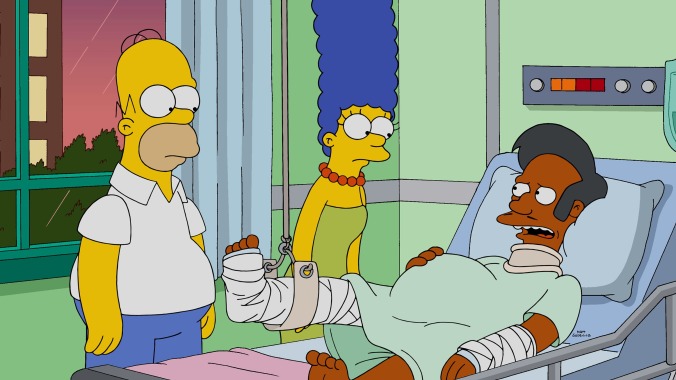The Simpsons' producers confirm Hank Azaria will no longer voice Apu

In January, Hank Azaria announced that he would no longer be voicing The Simpsons’ Apu Nahasapeemapetilon, an Indian immigrant, though the show itself refused to comment. Today, in a New York Times piece on the controversy surrounding Azaria’s performance, the executive producers have finally released a statement. “We respect Hank’s journey in regard to Apu,” they said. “We have granted his wish to no longer voice the character.”
They wouldn’t, however, clarify what this meant for the future of the Kwik-E-Mart owner, who’s been the subject of a fierce debate following comedian Hari Kondabolu’s 2017 documentary about the show’s stereotypical depiction of a culture that, for years, lacked representation on film and TV. “Apu is beloved worldwide,” the statement continued. “We love him too. Stay tuned.”
Azaria himself unpacks his own journey in the piece, detailing how he initially bristled at Kondabolu’s statements—“We make fun of everyone,” Azaria recalled himself thinking in defense. “Don’t tell me how to be funny”—but that he eventually came around to understanding the various critiques, especially when he framed it through his own Jewish identity. “[I]f that character were the only representation of Jewish people in American culture for 20 years, which was the case with Apu, I might not love that,” he said.
“What happened with this character is a window into an important issue,” Azaria continued. “It’s a good way to start the conversation. I can be accountable and try to make up for it as best I can.”
His reflection also caused him to interrogate the influences he fed into the character, which include 1968's The Party, a film in which Peter Sellers’ plays an Indian actor in brownface. “That represents a real blind spot I had,” Azaria said. “There I am, joyfully basing a character on what was already considered quite upsetting.”
“Once I realized that that was the way this character was thought of, I just didn’t want to participate in it anymore,” Azaria said. “It just didn’t feel right.”
Azaria says it was roughly a year ago that Azaria told the executive producers that he no longer wanted to voice the role. Despite having recently produced a critically maligned episode that smugly addressed the controversy (and comments from creator Matt Groening that made light of it), they were ultimately amenable. “When I expressed how uncomfortable I was doing the voice of the character, they were very sympathetic and supportive,” Azaria said. “We were all in agreement.”
Read the full interview here.